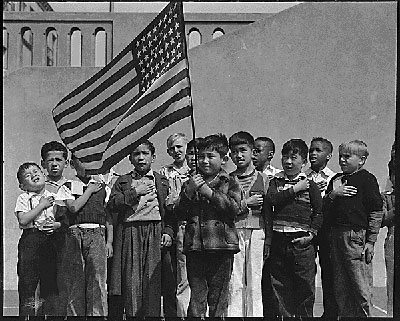Dorothea Lange Japanese Internment Photographs: Difference between revisions
Liz Una Kim (talk | contribs) (Created page with "{{DISPLAYTITLE:<span style="font-style: italic;">Dorothea Lange Japanese Internment Photographs</span>}} ====Date: 1941==== ====Region: [[:Category:North Amer...") |
Liz Una Kim (talk | contribs) No edit summary |
||
| (2 intermediate revisions by the same user not shown) | |||
| Line 15: | Line 15: | ||
'''Location:''' California, United States | '''Location:''' California, United States | ||
[[File:Impounded.jpg]] | |||
'''Description of Artwork:''' ''Dorothea Lange's Japanese Internment Photographs'', are a series of black and white images which document the 1941 Japanese American Internment. The photographs depict the rounding up of Japanese Americans who were living along the Pacific coast of the United States to camps called "War Relocation Camps," authorized by President Franklin D. Roosevelt following Japan's attack on Pearl Harbor. This photojournalistic project was assigned to Dorothea Lange by the War Relocation Authority (WRA), possibly to prove that the detainees were not being mistreated and that the international law was not violated. Most of the photos highlight Manzanar, the first of the internment camps. In her work, Lange emphasizes the detainees' essential Americanness, as 62% were reported to have been American citizens, and is uncompromising of the conditions of the permanent internment camps. | '''Description of Artwork:''' ''Dorothea Lange's Japanese Internment Photographs'', are a series of black and white images which document the 1941 Japanese American Internment. The photographs depict the rounding up of Japanese Americans who were living along the Pacific coast of the United States to camps called "War Relocation Camps," authorized by President Franklin D. Roosevelt following Japan's attack on Pearl Harbor. This photojournalistic project was assigned to Dorothea Lange by the War Relocation Authority (WRA), possibly to prove that the detainees were not being mistreated and that the international law was not violated. Most of the photos highlight Manzanar, the first of the internment camps. In her work, Lange emphasizes the detainees' essential Americanness, as 62% were reported to have been American citizens, and is uncompromising of the conditions of the permanent internment camps. | ||
Latest revision as of 00:50, 21 December 2011
Date: 1941
Region: North America
Subject: Images
Medium: Photography
Artist: Dorothea Lange
Confronting Bodies: U.S. Army
Dates of Action: February - July 1942
Location: California, United States
Description of Artwork: Dorothea Lange's Japanese Internment Photographs, are a series of black and white images which document the 1941 Japanese American Internment. The photographs depict the rounding up of Japanese Americans who were living along the Pacific coast of the United States to camps called "War Relocation Camps," authorized by President Franklin D. Roosevelt following Japan's attack on Pearl Harbor. This photojournalistic project was assigned to Dorothea Lange by the War Relocation Authority (WRA), possibly to prove that the detainees were not being mistreated and that the international law was not violated. Most of the photos highlight Manzanar, the first of the internment camps. In her work, Lange emphasizes the detainees' essential Americanness, as 62% were reported to have been American citizens, and is uncompromising of the conditions of the permanent internment camps.
The Incident: Even during the length of her project, Lange was restricted in access at all of the 21 locations she visited by the government. She was discouraged from talking to the detainees, not allowed to photograph parts of Manzanar (i.e. wire fences, watch towers, armed guards, signs of resistance) and even almost dismissed when one of her photos were used for a Quaker pamphlet opposing the internment. Once she had completed producing more than 800 photographs, the U.S. Army, the military authority, interpreted them as clearly critical of the internment and impounded them for the duration of the war.
Results of Incident: After the conclusion of the Second World War, the photographs were then quietly placed in the United States National Archives, a free public domain maintained by the government. The photographs silently sat in the archives without much attention, despite Lange's reputation, until a book titled "Impounded: Dorothea Lange and the Censored Images of the Japanese American Internment" presenting 199 of Langes' initially censored images was published by W. W. Norton & Company in 2006 in collaboration with historians Linda Gordon and Gary Okihiro. They are also now available in the National Archives of University of California, Berkeley's Bancroft Library under the Still Photographs Division.
Source: "Internment Without Charges: Dorothea Lange and the Censored Images of Japanese American Internment," Linda Gordon <http://www.worldpress.org/2588.cfm>
"Photographs of an Episode That Lives in Infamy," Dinitia Smith <http://www.nytimes.com/2006/11/06/arts/design/06lang.html>
"Newly Released Photos Tell Story of Internment," NPR <http://www.npr.org/templates/story/story.php?storyId=6519565></a>
"Oakland Museum of California - Dorothea Lange" <http://museumca.org/global/art/collections_dorothea_lange.html>
